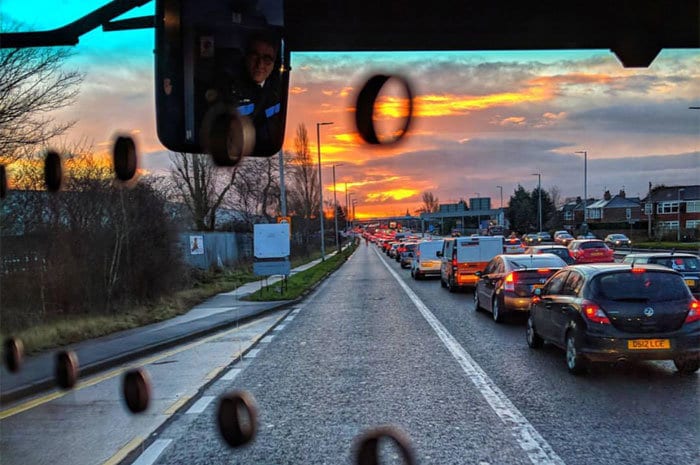Manchester car commuters could face new pollution tax to meet EU limits
- Written by Ray King
- Last updated 7 years ago
- Community, Sport

Manchester town hall bosses are to consider proposals for a workplace parking levy in a bid to reduce air pollution in the city.
But the idea – one of a number of solutions aimed at meeting European Union pollution limits – is already under fire from an influential Labour MP who claims that taxing companies that provide car parking spaces for employees would damage the city’s economy.
Graham Stringer, MP for Blackley and Broughton, a staunch opponent of the proposed congestion charge a decade ago, said: “There are few cars in the city centre now. Most pollution is caused by buses, lorries and wood-burning stoves, so there is no basis for taxing business while not really reducing air pollution as much as some people think.”
Workplace levies were introduced in 2012 in Nottingham where businesses are charged £400 a year if they provide more than ten parking spaces for their workers.
Lobby group Campaign for Better Transport, which backs imposing the levy in Manchester, claim that the scheme in Nottingham had cut congestion, improved air quality and funded better public transport.
Local councils were granted powers to impose workplace parking levies and congestion charges in 2000. Manchester decided not to adopt the scheme and instead opted for an all-embracing congestion charge aimed at funding the expansion of the Metrolink tram system.
The proposal was eventually overwhelmingly rejected four to one by voters in a referendum in 2008.
Mr Stringer, a member of the House of Commons air pollution select committee, said Manchester had not adopted the workplace parking levy earlier because the cost to business would have had to be huge in order to pay for the Metrolink expansion. The congestion charge within the outer ring road was chosen because it would have produced a much higher income stream.
Mr Stringer said: “My view is that it would be damaging to the city’s economy. This all stems from the government saying there are a number of districts that are not complying the EU legislation on air quality.
“Someone took the government to court and the court ruled that the law had to be obeyed. So the government, which has done nothing about Volkswagen cheating on exhaust emissions, just passed the buck to local authorities to sort out.”
He said there were alternatives to taxing road commuters and described EU air quality tests as “dodgy”.
It is understood that the Transport for Greater Manchester report, which will be considered at the council’s executive meeting on 7th February, also includes proposals to offer free parking for electric vehicles and measures to reduce the number of diesel-powered buses and taxis.
But the extent of work place parking charge proposals remains unclear, as does the question of who would pay – driver or employer – and whether existing public transport could cope at peak times with extra passengers driven off the roads.
- This article was last updated 7 years ago.
- It was first published on 3 February 2018 and is subject to be updated from time to time. Please refresh or return to see the latest version.
Did we miss something? Let us know: [email protected]
Want to be the first to receive all the latest news stories, what’s on and events from the heart of Manchester? Sign up here.
Manchester is a successful city, but many people suffer. I Love Manchester helps raise awareness and funds to help improve the lives and prospects of people across Greater Manchester – and we can’t do it without your help. So please support us with what you can so we can continue to spread the love. Thank you in advance!
An email you’ll love. Subscribe to our newsletter to get the latest news stories delivered direct to your inbox.
Got a story worth sharing?
What’s the story? We are all ears when it comes to positive news and inspiring stories. You can send story ideas to [email protected]
While we can’t guarantee to publish everything, we will always consider any enquiry or idea that promotes:
- Independent new openings
- Human interest
- Not-for-profit organisations
- Community Interest Companies (CiCs) and projects
- Charities and charitable initiatives
- Affordability and offers saving people over 20%
For anything else, don’t hesitate to get in touch with us about advertorials (from £350+VAT) and advertising opportunities: [email protected]

The very special toy shop where parents don’t pay a penny is open – and busier than ever

Manchester’s oldest homelessness charity celebrates 40 years of supporting the needy

Games, science and history collide at Manchester’s Science and Industry Museum this winter

Best bars and pubs to watch the football and live sport in Manchester

How Baguley Hall Primary School is nourishing minds with a morning Magic Breakfast















